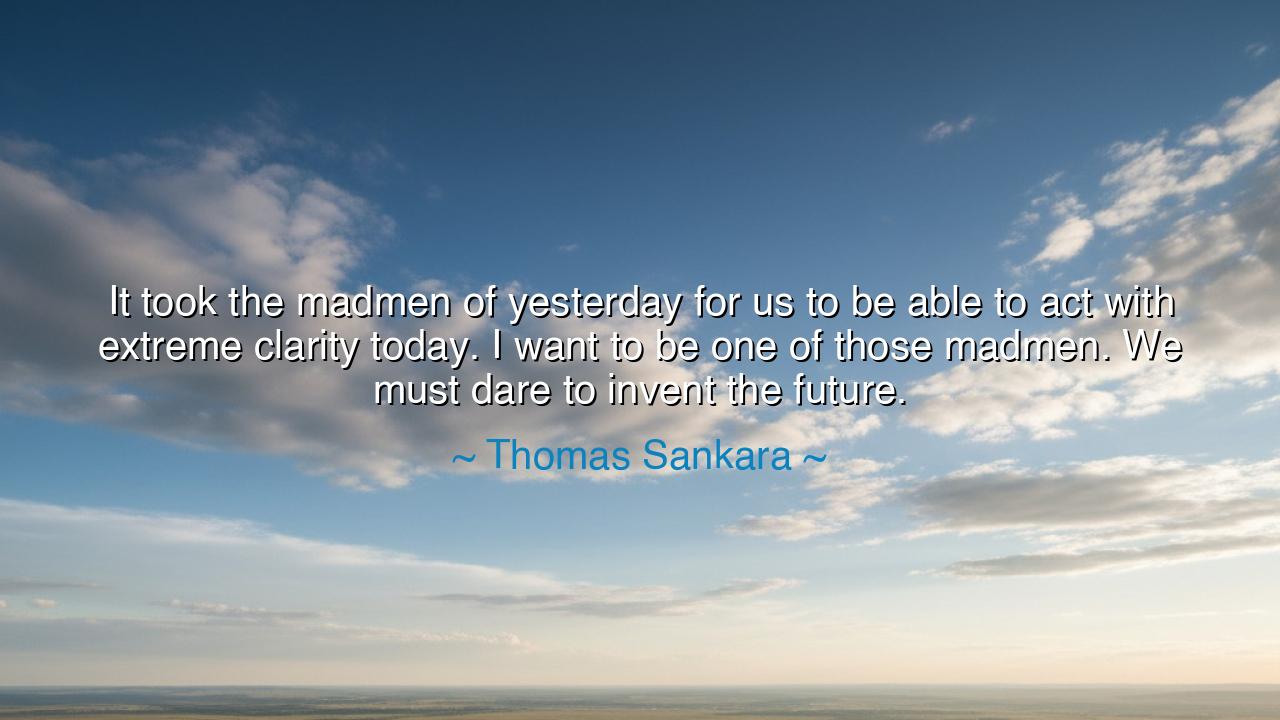
It took the madmen of yesterday for us to be able to act with
It took the madmen of yesterday for us to be able to act with extreme clarity today. I want to be one of those madmen. We must dare to invent the future.






"It took the madmen of yesterday for us to be able to act with extreme clarity today. I want to be one of those madmen. We must dare to invent the future." These words, spoken by the visionary Thomas Sankara, resonate with a profound truth about innovation, vision, and the necessity of bold action. Sankara, in his time as the president of Burkina Faso, understood that change does not come from complacency or adhering to the status quo, but from those who dare to challenge the norms, who dare to be madmen in their pursuits. To be a madman in this context is to break free from the conventional, to see what others cannot yet perceive, and to forge a path toward a future that is radically different from the past.
In the ancient world, those who sought to change the world were often labeled as visionaries or madmen, yet their actions shaped the course of history. Socrates, the father of philosophy, was condemned as a madman by the Athenian society because he questioned the very foundations of morality and knowledge. He believed that the pursuit of truth and wisdom was more important than conformity, and for his insistence on teaching a new way of thinking, he was sentenced to death. Yet, the ideas he left behind sparked an intellectual revolution that shaped Western philosophy and science for millennia. Socrates dared to be mad in his thinking, and in doing so, he laid the groundwork for a future that would see the rise of intellectual freedom and reason.
Similarly, the great conqueror Alexander the Great could be seen as a madman in his own time. His vision of a unified world—stretching from Greece to India—was considered audacious and even impossible by many of his contemporaries. Yet, through visionary leadership and an unwillingness to accept the boundaries of his world, Alexander expanded the Greek empire, establishing a legacy that would influence the cultures of the East and West for generations. Alexander’s “madness” was in his belief that the future could be shaped through bold action, and he acted accordingly, changing the world with the strength of his will.
Thomas Sankara himself was a modern-day embodiment of this madness. In a world still reeling from colonialism and deeply entrenched social inequalities, Sankara rejected the conventional path. His leadership of Burkina Faso was rooted in his belief that the future could be forged through radical self-reliance, land reforms, and gender equality. He understood that the path to true freedom required breaking with the old, and in doing so, he faced overwhelming opposition. Yet, his madness, his visionary ideas, challenged not only the norms of his nation but the very foundations of the global power structures that sought to keep Africa in a state of dependence. Sankara dared to imagine a future where Africa would stand on its own two feet, and though his life was tragically cut short, his ideas continue to inspire.
The lesson that Sankara imparts is one of unwavering conviction—that true change requires the courage to be seen as mad by those who cling to the old ways. It is the bold thinkers who challenge the status quo, who are willing to risk everything for the sake of their vision, that move history forward. These are the madmen of history—those who dared to see a world beyond the limitations of their time. In every revolution, in every great change, there were those who were considered mad, and yet, it was their madness that brought the future into existence.
In our own lives, this wisdom calls us to dare greatly. Do not shy away from the challenges that seem impossible or the dreams that others call unrealistic. Instead, take inspiration from those who have dared to be mad, to see the future as something malleable and full of possibility. Whether in our careers, our personal lives, or our communities, we must press forward with vision and action, even if the road ahead seems uncertain. Like Socrates, Alexander, and Sankara, we must learn to embrace the role of the visionary, the one who dares to create a new reality, not because it is easy, but because it is the only way to forge a future of meaning.
The future does not belong to those who wait for it to come to them, nor to those who adhere to the old ways. It belongs to those who, like the madmen of yesterday, dare to invent it. Take risks, embrace your vision, and never let fear of being called mad stop you from striving to shape a world that is more just, more equitable, and more aligned with the values you believe in. In this pursuit, your actions today will plant the seeds for a future that is yours to create. And when the future comes, let it be a reflection of your courage, your vision, and your daring spirit.






AAdministratorAdministrator
Welcome, honored guests. Please leave a comment, we will respond soon